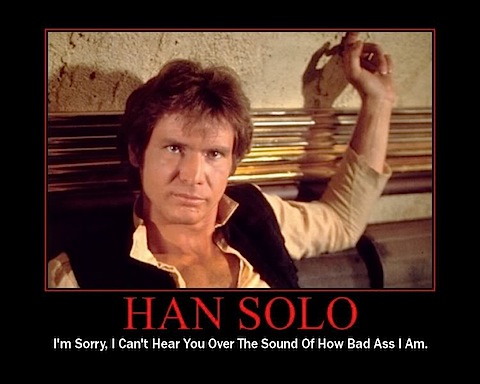The following originally appeared in The Peak. It is the final edition of a seven week column. It was a long strange trip, and I thank you for reading.
It’s some strange justice that the current pulse of Star Wars fandom is talk of the series’ complete demise. Strange — but not surprising — as there’s nothing quite as fascinating as spectacular failure. George Lucas knew this, which is why he made sure Empire was as depressing as possible.
Head on over to YouTube and search for “Star Wars†and you’ll be treated to some thoroughly entertaining journalism on the subject of spectacular failure, specifically the Star Wars prequels. This comes courtesy of RedLetterMedia and Mr.Plinkett, the sociopath star of the outfit’s hour-plus long reviews of the films.
In it, his sardonic analysis of the films is cut with a darkly funny portrayal of a man beset by psychosis and obsession, his basement (pointedly) the scene of purported grisly deeds. The realization of this character is incisive service for and against those who would cast anyone with interest in the subject matter as a parent’s basement dwelling, sycophantic dork with mommy issues. It’s done so well, in fact, that you might not even notice that the character is a perfect metaphor for the Trilogy That Couldn’t; a man with no redeeming qualities, no hope, and no future. Star Wars asks the same question with its plot and characters: is redemption available?
The Star Wars universe is set in orbit around Luke Skywalker, a young man from the interstellar Bread Basket (or Water Basket, as the case may be), gone off to the big city to make good and beat up his dad. His personal journey, however, is marked early with the obligation to redeem the Skywalker name, and to fulfill the destiny his father set back a great deal — to bring balance to the light and dark sides of the Force. The weight of this is comparable to Adolf Hitler Jr. job hunting in 1956. Significant is the operative word there.
At the end of Return of the Jedi, Darth Vader has his human cockles tickled by the torture of his son and decides to take a hot electricity injection for him, turning on his master and ending the Sith Empire he helped bring to pass. This is an odd storytelling choice, one that seems so perfect in hindsight but could have very easily been different. If Luke strikes his father down, good triumphs over evil, right?
The fly in the Vaseline is that this is a particularly Sith course of action. Murder is pretty uncool for a Jedi. Trapped between a homicide and a hard place, Lucas needed an asteroid or drunk TIE fighter pilot to crash into the throne room, eliminating the three biggest potential threats to the galaxy. But Star Wars aims higher than that. Han Solo is the test bed for George Lucas’ philosophy of redemption, but Darth Vader is his finished symphony.
Lucas is reaching out a hand to the droves of fans that have flocked to a shared fantasy, telling those who might sit a little too close to the screen that their time spent is not wasted. He is giving retroactive justification to those of us who lean just a little too hard on the lives and experiences of people who will never exist outside celluloid and CG.
Just like Vader turned it around for a quickie deathbed sacrament, just like a hand getting cut off didn’t stop Luke, and just like they all ignored C-3PO’s advice and went up against the Imperial “Wookiee†at the risk at having their arms torn off (see what I did there?), Lucas aims to prove that a third act in life is not only possible, but well within reach.
So for those who are looking for coping tools in the exploits of fake smugglers and warrior monks, for fanboys dealing with exaggerated reports of their failure and a filmmaker tasked with following his own greatness, Star Wars can teach us that redemption is only as remote as the effort we are willing to put in.
Maybe instead of a rise and fall, we should try for a fall and rise.
Comments Off on Let The Wookiee Win Week 7: Just A Flesh Wound